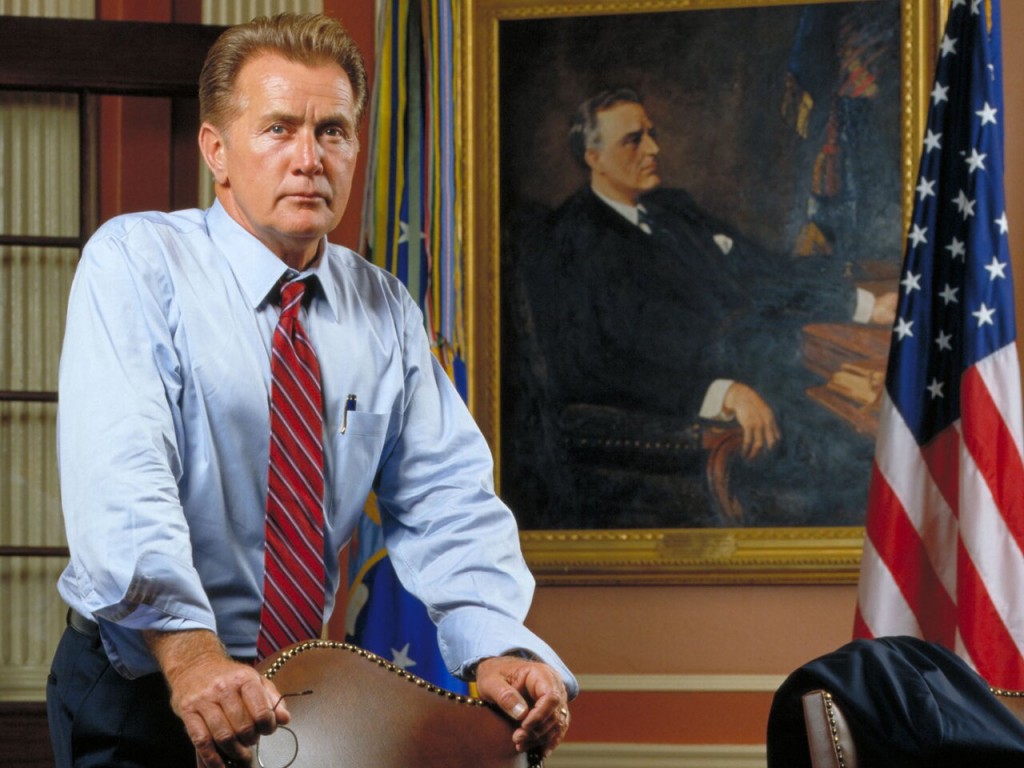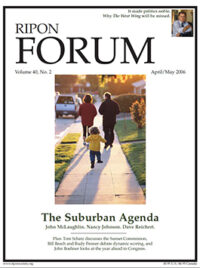
We wring our hands in this third century of the American Experiment. More of us, we’re told, can identify Paris Hilton than Paris, France. Frothy celebrity magazines thrive while serious political journals struggle. Citizens seem more excited about voting for the American Idol than the American President. Entertainment trumps civic engagement; staying amused is more appealing than staying informed; and in the struggle for the American soul, Hollywood, not Washington, seems to have been our capital for a long time now. Perhaps it’s because Hollywood knows how to talk. In the ancient old art of rhetoric, Hollywood has Washington beat hands down — even when it’s telling stories about Washington.
What was so compelling about The West Wing wasn’t its politics, but the way its characters talked about politics. Their speech was literate, intelligent, and sophisticated; open to nuance and ambiguity. Sure, the orations of President Bartlet (Martin Sheen) and the monologues of his staff could be melodramatic, overwrought, idealistically naïve, and hyperbolic. But they were also usually convincing and always refreshingly candid. And it’s not like Cicero, Lincoln, or Martin Luther King were adverse to a little melodrama and hyperbole. Public political communication is a rhetorical performance — an act of persuasion.
What was so compelling about The West Wing wasn’t its politics, but the way its characters talked about politics.
More than anything, The West Wing was about language, and how to find language with which to talk about politics with vision and sincerity in a nation where cynicism has been metastasizing since Vietnam, Watergate, Monica, and beyond. Remarkably, The West Wing presented government as something noble, civic life as something to be proud of. An episode in the fall of 2000 actually ended with the whole staff repeating the phrase “God Bless America” in a toast. Wizened, thinking citizens in this time between the Clinton impeachment and the terrorist attacks of September 11 might have been expected to roll their eyes at the Capra-esque jingoism of such a scene, but they didn’t. The scene worked. In spite of their hip, ironic, Machiavellian dialogue, the characters on The West Wing exhibited an earnestness that seems impossible in the era of Jon Stewart’s Daily Show, and unlikely since the era of Laugh-In.
Around the same time that episode was playing, George W. Bush and Al Gore were engaging in the first of a series of televised debates. Here, the rhetoric wasn’t quite so inspiring. The debate offered little in the way of memorable imagery or metaphor. The best one-liner of the night was Bush’s, “I’m beginning to think not only did he invent the Internet, he invented the calculator.” Needless to say, it was no, “You’re no Jack Kennedy.” The entire debate revealed a notable poverty of political rhetoric. A good latenight infomercial was better at selling an idea; a taped-delayed Olympic medal ceremony better at eliciting pride of nationhood. A viable language, style, and vocabulary seem very often to elude contemporary American leaders.
People spent a lot of time uncovering and exposing the liberal messages in The West Wing, which was kind of like spending time uncovering and exposing the traditional family values in The Waltons. The West Wing was, after all, a show about a liberal Democratic administration. Its principal characters were liberal Democrats, as were many (but certainly not all) of the people who made the show. It wasn’t just the president and his staff who were articulate on The West Wing, however. Their Republican opponents were also masters of the language. If the victories of the superheroes are to mean anything, of course, they have to do battle with adversaries that are worthy of the fight. Arch-Republican and recurring character Ainsley Hayes (Emily Procter) was such an adversary. She could deliver pitch-perfect oratorical flourishes that left her Democratic listeners speechless on more than one occasion. In the presidential election campaign of the final season, the Republican candidate Arnold Vinick (Alan Alda), has proven a formidable opponent indeed, his rhetorical skills matching, if not surpassing, his adversary in the live debate that aired last November.
Television is often blamed for the “dumbing down” of political discourse, but the political discourse we heard on The West Wing was usually a lot more intelligent and complex than what we hear in actual political speeches.
As for the larger claims made by fans of The West Wing, we should tread carefully. It isn’t a civics lesson. One should no more turn to The West Wing to learn about presidential politics, policy, and procedures than one should turn to ER to learn about emergency surgery or to Shakespeare to learn about the reign of Richard III. Sure, some insights may be gleaned from these sources, but they are all, in the end, fiction and fantasy.
Political rhetoric at its best is supposed to move its audience — to engage them, to make them care, to make them interested. Much political speech today doesn’t do that. It succeeds only in making the other side angry. Television is often blamed for the “dumbing down” of political discourse, but the political discourse we heard on The West Wing was usually a lot more intelligent and complex than what we hear in actual political speeches, even big and important ones.
In this regard, perhaps it could also be argued that The West Wing set the bar too high when it came to American politics. It raised our expectations of how public officials should talk, only to have these same expectations lowered when we realized that politicians in real life are not nearly as eloquent as the actors who play them on TV.
While this last point is obviously debatable, one thing is certain – Hollywood and Washington are both in the business of communicating with our nation’s citizens. Washington, these days, just isn’t very good at it.
Robert J. Thompson is Trustee Professor of Media and Popular Culture in the Newhouse School of Public Communication at Syracuse University, where he is also founding director of the Bleier Center for Television and Popular Culture. He has written or edited six books on American TV.




